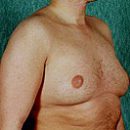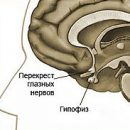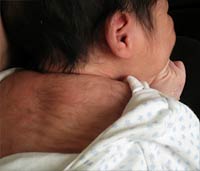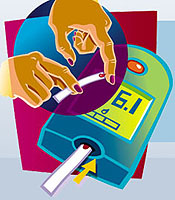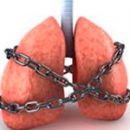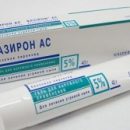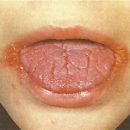The highest value in the diagnosis of diffuse toxic goiter has a clinical picture and laboratory research methods. Determination of the concentration of thyroid hormones in the blood is crucial in the diagnosis.
Content
Diffuse toxic goiter is an autoimmune disease due to excessive secretion of thyroid hormones and manifested by diffuse increase in thyroid gland. The main manifestations of the disease is smooth, velvety, wet skin, tremor fingers, injection of blood vessels (muddy or «Red eyes»), there is a constant rapid heartbeat, the lack of a pulse gear on the breath and alone. Thyroid gland is evenly increased, elastic, more often without knots.
Laboratory definition of hormones
At the initial stage of surveys of patients with toxic goiter, it is necessary to determine the levels of hormones:
- thyrotropic hormone (TTG)
- thyroglobulin
- Tyroxin Shared (T4 common, Tetraiodththnin common, Total Thyroxine, TT4)
- free thyroxine (less frequently free triiodothyronine)
- Determination of antibodies to Tyroglobulin
- thyroid peroxidase and a thyrotropic hormone receptors
Thyroid-stimulating hormone
A thyrotropic hormone is produced in a pituitary gland to increase the intake of iodine from blood plasma in thyroid cells. Under the influence of tirotropic hormone, the synthesis of the main hormones of the thyroid gland - thyroxine and triiodothyronine.
Indications for assay analysis:
- Detection of hidden hypothyroidism
- Control study with detected hypothyroidism (for life 1 - 2 times / year)
- Control study with detected diffuse toxic zob (1.5 - 2 years 1 - 3 times / month)
- Delay mental and sexual development in children
- Goiter
- Cardiac arrhythmias
- Mopathia
- Idiopathic hypothermia
- Depression
- Alopecia
- Infertility
- Amenorrhea
- Impotence and Reducing Libido
- Hyperprolactinemia
Preparing for the study: on the eve of the study it is necessary to exclude exercise (sports training), alcohol and smoking.
General Tyroxin
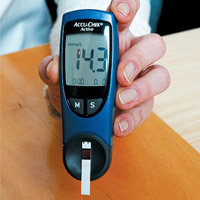 Common thyroxine is produced in the thyroid gland under the influence of the tometropic hormone of the pituitary. Most of the circulating in the blood of thyroxine is associated with proteins, and only the free part of the hormone has biological effects.
Common thyroxine is produced in the thyroid gland under the influence of the tometropic hormone of the pituitary. Most of the circulating in the blood of thyroxine is associated with proteins, and only the free part of the hormone has biological effects.
Under the influence of general thyroxin, the speed of the main exchange increases, the heat supply and oxygen consumption increases with all the tissues of the body, with the exception of brain tissues, which increases the need of the body in vitamins, is stimulated by the synthesis of vitamin A in the liver, reduces the concentration of cholesterol and triglycerides in the blood, accelerates the exchange of protein.
Indications for assay analysis:
- Reduced or elevated TSH
- Goiter
- Clinical picture of hypothyroidism or thyrotoxicosis
Preparing for research: for 2 - 3 days before the study, the reception of iodine-containing drugs is excluded, for 1 month - thyroid hormones, if there are no special instructions of the endocrinologist. Blood takes should be carried out before research, using X-ray funds. On the eve of the study it is necessary to exclude physical exertion and stress. Immediately before taking the blood, the patient must be in a state of rest of at least 30 minutes. Blood is taken on an empty stomach.
Determination of antibodies to thyreoglobulin
Thyroglobulin - iodized protein from which thyroid hormones are formed (thyroxine and triiodothyronine). Antibodies to thyroglobulin are an important parameter for detecting autoimmune diseases of the thyroid gland, such as Hashimoto disease, atrophic autoimmune thyroiditis, diffuse toxic goiter.
In patients with thyroidite, the level of antibodies in the process of treatment is usually reduced, but it may be a wave-like flow with a period of about 2 to 3 years.
The definition of antibodies to the teroglobulins makes it possible to predict the disorder of the thyroid function in patients with other autoimmune endocrine diseases and members of families with hereditary autoimmune diseases. In children born from mothers with high tutors of antibodies to thyroglobulin, autoimmune thyroid diseases may develop, which requires assigning such children to the risk group.
Indications for assay analysis:
- Newborn (high level of at-tg of mother)
- Chronic thyroiditis in adults (Hashimoto)
- Differential diagnosis of hypothyroidism
- Goiter
- Diffuse toxic goiter (Greiva's disease)
- Tight swelling edema (peritibial mixedma)
Preparing for research: not required.
In addition, conduct a study of the main exchange, the absorption of the radioactive iodine of the thyroid gland, the level associated with the Yoda proteins.
Tool methods
The last group of methods is less informative and in recent years is used. From instrumental methods use ultrasound examination, allowing to detect an increase in the gland and the presence of nodes.
Ultrasonic study (ultrasound) of the thyroid gland - a method that allows you to see cloth gland, its structure, pathological formations in it. With diffuse toxic goiter, a diffuse increase in the thyroid gland is determined. If the cause of tyrotoxicosis is different, the ultrasound will help carry out differential diagnosis with nodal and multi-nose formations of the thyroid gland.

